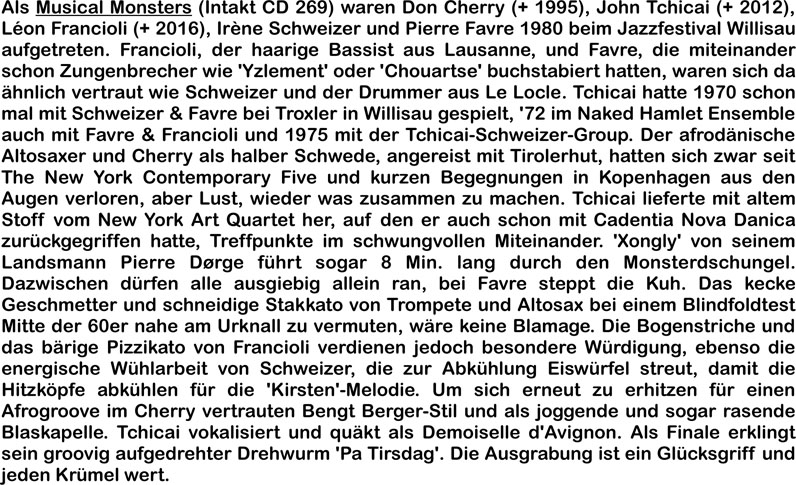
Rigobert Dittmann, Bad Alchemy 91, 2016
Voici un album qui aurait pu ne jamais exister.
Le 30 août 1980, au Jazz Festival de Willisau, Niklaus Troxler présentait un concert unique: la rencontre entre 5 "monstres" du free jazz. Pendant des années, l'enregistrement du concert resta dans les archives du producteur suisse jusqu'au jour où son amie, la pianiste Irène Schweitzer, le découvrit. Pour elle, c'était une évidence: il fallait éditer cet enregistrement pour plusieurs raisons. Pas seulement parce que c'était sa seule collaboration avec Don Cherry, mais, avant tout, parce que la musique incarnait pleinement la vitalité et la spontanéité du free jazz de l'époque et que ce quintet inédit constituait l'apogée de plusieurs rencontres initiées par Troxler. Depuis des années, celui-ci s'était lié d'amitié avec Irène Schweitzer et Pierre Favre, qu'il avait réunis pour son premier concert de free jazz, dès février 1968, à l'hôtel Kreuz, puis pour son festival de Willisau, auquel il convia aussi le contrebassiste Léon Francioli, à 7 reprises avec Favre, cinq avec Schweitzer. D'autre part, Troxler avait découvert Tchicai dès 1970 à Montreux et il avait décidé sur le champ de l'inviter à Willisau. Don Cherry avait été aussi programmé par Troxler, la première fois en 1976, en quartet, la deuxième en 1978, avec Nana Vasconcelos et Colin Walcot, le trio Codona. Troxler eut alors l'idée de réunir Tchicai et Don Cherry qui ne s'étaient plus rencontrés depuis un certain temps et de le faire avec la rythmique "maison".
Le souhait de la pianiste suisse de produire cet enregistrement est désormais accompli avec cet album Intakt: Musical Monsters qui n'usurpe pas son titre.
Membre du légendaire quartet d'Ornette Coleman, Don Cherry a aussi croisé John Coltrane, Albert Ayler, Sonny Rollins, Steve Lacy, Gato Barbieri et formé le New York Contemporary Five avec John Tchicai et Archie Shepp.
Tchicai, de son côté, a enregistré avec Archie Shepp (Four for Trane), avec Albert Ayler (New York Eye and ear Control) et John Coltrane (Ascension), il a participé au New York Contemporary Five, au New York Quartet avec Roswell Rudd et au New Jungle Orchestra de Pierre Dørge, il a joué avec Cecil Taylor et, en duo, avec notre compatriote André Goudbeek. Irène Schweitzer a croisé la crème du free jazz européen: Evan Parker, Joëlle léandre, Rudiger Carl, Han Bennink, Yves Robert, Daunik Lazro ou Barry Guy et a fait partie du London Jazz Composers Orchestra.
Léon Francioli a fait partie du Michel Portal Unit, avec Bernard Vitet, comme du dynamique quartet suisse BBFC (Bovard-Bourquin-Francioli-Clerc), il a aussi joué avec Pierre Favre et Mario Schiano.
Enfin, Pierre Favre a côtoyé Irène Schweitzer, Kenny Wheeler, Roberto Ottaviano, Michel Godard ou Samuel Blaser et, à côté de ses albums en solo, il a formé le quartet de percussions Singing Drums avec Paul Motian.
Le jour du concert, les répétitions furent réduites à leur plus simple expression, tout juste de quoi fixer une feuille de route: quatre compositions en guise de fil rouge, quatre thèmes qui devaient surgir au creux des solos et improvisations collectives. Trois compositions de Tchicai: Transportation of noodles qu'il avait joué avec Pierre Dørge, Real Kirsten et Pá Tirstag écrits pour sa formation Cadencia Nova Danica. Une de Pierre Dørge: Xongly que Tchicai avait joué avec Dørge en quartet avec NHOP et Billy Hart (album Ballad round the left corner).
Mais la façon dont les 5 "monstres" abordent ces thèmes est révélatrice de l'esthétique free. Au lieu d'être exposés par l'ensemble de la formation, pour servir de point de départ à une série de solos et clore ensuite la plage, les thèmes surgissent, souvent tardivement, au creux de solos et improvisations collectives. Ainsi, la pièce la plus libertaire, Musical Monster 1, voit se succéder riff de Don Cherry, sur fond de crissements de l'archet, saxophone incisif, à la sonorité acidulée, puis, vers la 5e minutes, solo de contrebasse en pizzicato et, de nouveau impro de trompette, saxophone et piano, avant que n'arrive, pour une brève apparition, le thème de Real Kirsten à la 11e minutes. La deuxième plage s'ouvre sur une longue intro d'alto, entrecoupées d'effets de voix et le thème de moins d'une minute, Transportion of noodles, n'arrive qu'après 12 minutes. Par contre, Xongly est joué en début de Musical Monster 3, comme un thème obsessionnel, volontiers répétitif sur lequel viennent se superposer, tel un mille-feuilles, les impros successives. La 4e plage s'ouvre sur un solo volubile d'alto puis de trompette avant que le thème Pá Tirstag ne soit exposé pendant quatre minutes.
Dans la construction de la musique - l'improvisation libre dominant la ligne mélodique -, comme dans l'approche des instruments, ces Musical Monsters illustrent parfaitement le free jazz des années 80 et sa quête de spontanéité.
Claude Loxhay, Jazzholo, Belgium, August 2016
Musical Monsters (Intakt 269; Switzerland) Featuring Don Cherry on pocket
trumpet, John Tchicai on alto sax, Irene Schweizer on piano, Leon Francioli
on acoustic bass and Pierre Favre on drums. This set was recorded live at
the Willisau Jazz Festival in Switzerland in August of 1990 and had been
packed away & forgotten until Ms. Schweizer finally heard it more recently
and pressed for it s release. Although Don Cherry and John Tchicai had
played together & recorded in 1963/1964 for Albert Ayler and the New York
Contemporary Five, they had long lost touch and had played together for
many years. It took Willisau organizer, Niklaus Troxler, a while to gather
this extraordinary quintet together and it turned out to better than anyone
would've imagined. Swiss pianist Irene Schweizer and Pierre Favre had
worked together for many years prior to this, in both duo and trio
situations as well as being guest members of the London Jazz Composers
Orchestra for t'he Double Trouble' recordings. Swiss bassist Leon Francioli
had also worked with Michel Portal and Joe McPhee (all for the Hat Hut or
Art labels).
There are four long pieces on this disc which include riffs or melodies
from songs written by Don Cherry, John Tchicai and Danish
guitarist/bandleader Pierre Dorge who had worked with Mr. Tchicai on
occasion. The opening bit is somewhat chaotic, yet bristling with organic
energy, slowly coming together as it evolves. The trumpet, alto sax and
piano all swirl around one another in tight spirals, completing each others
lines in a most magical ways. The rhythm team speeds up and slows down as
if they were one solid unit. Both Don Cherry and John Tchicai sound as if
they have been playing together for many years although is has been more
like 25+ years since they last recorded. "Musical Monsters 2" starts with
a John Tchicai melody called, "Transportation of Noodles" which son mutates
in freer terrain. The interplay between the trumpet, sax and piano is
exceptional, the balancing of several connected strands woven tightly.
Midway there is one of those sort of South African melodies that often
seals into Ms. Schweizers playing, adding lovely, earthy resonance to the
music. Mr. Tchicai does a short scatting vocal when the group quotes,
"Three Blind Mice", adding to its childlike charm. Pierre Favre has long
been one of finest and most creative drummers in Europe. His solo here is
just one of the numerous highlights on this great disc, melodic, rhythmic
and story-like in structure. Don Cherry is in a most playful mood here, he
sounds like he is having a blast playing with a perfectly balanced quintet,
everyone listening closely and casting a spell of righteous and infectious
glee and craft. Could this be the most important historic recording of the
year? No doubt in my mind! -
Bruce Lee Gallanter, DMG, New York, August 18, 2016
Frem fra glemselen
Et av den moderne jazzens største ikoner, Don Cherry, er fortsatt med oss - med musikken sin.
Don Cherry og John Tchicai sammen med et sveitsisk kremlag.
Helt siden trompeteren Don Cherry, stort sett på såkalt lommetrompet, snudde opp ned på de fleste forestillinger om hvordan jazz skulle låte på slutten av 50-tallet sammen med Ornette Coleman, så har ikke "verden" blitt den samme. Først var det på den amerikanske vestkysten de la grunnlaget, før de dro videre til New York og deretter la resten av verden for sine føtter - på et vis i alle fall.
Cherry (1936-1995) var en verdensborger og bodde deler av livet sitt i Sverige også. Her hjemme fikk vi møte han flere ganger og han gjorde også ei liveskive med gruppa Tamma fra en Moldefestival. Sammen med den danske altsaksofonisten John Tchicai (1936-2012), med røtter fra Kongo, var Cherry en av de viktigste premissleverandørene for den frie jazzen med røtter både i Afrika og i India - Cherry var en verdensmusikant lenge før begrepet blei født.
I 1980 blei Cherry og Tchicai invitert til Willisau-festivalen for å møte trommeslageren Pierre Favre, bassisten Léon Francioli (1946-2016) og pianisten Irène Schweizer. Konserten, som varte cirka en time, blei tatt opp og har hele tida vært i festivalsjef Niklaus Troxlers eie. For noen år siden fikk Schweizer høre for første gang det hun var med på og hun insisterte på at musikken måtte ut til allmuen. Hun mente den var så frisk, så original og så tidløs som vel tenkelig, og det er ikke vanskelig å være enig i det.
Jovisst er musikken fri, men den er tildels også både rytmisk og melodisk sterk. Den danske gitaristen Pierre Dørge har vært med å gå gjennom opptakene og har "identifisert" mange låter som er "med".
Don Cherry og John Tchicai, sammen med dette sveitsiske stjernelaget, forteller oss at de har mye å fare med også med musikk skapt i 1980.
torhammero, Tor DE JAZZ, 22.08.2016
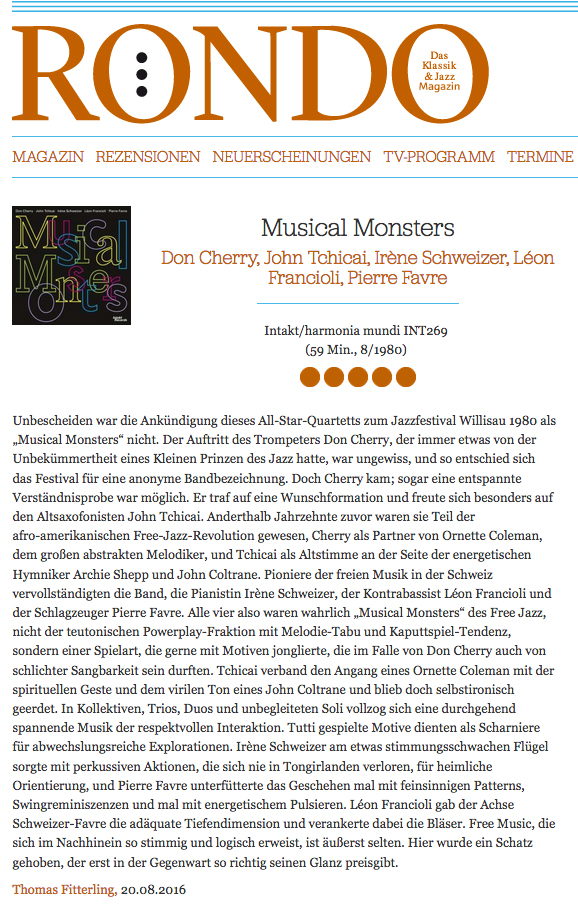
Thomas Fitterlling, Rondo - Das Klassik & Jazzmagazine, 20. 8. 2016
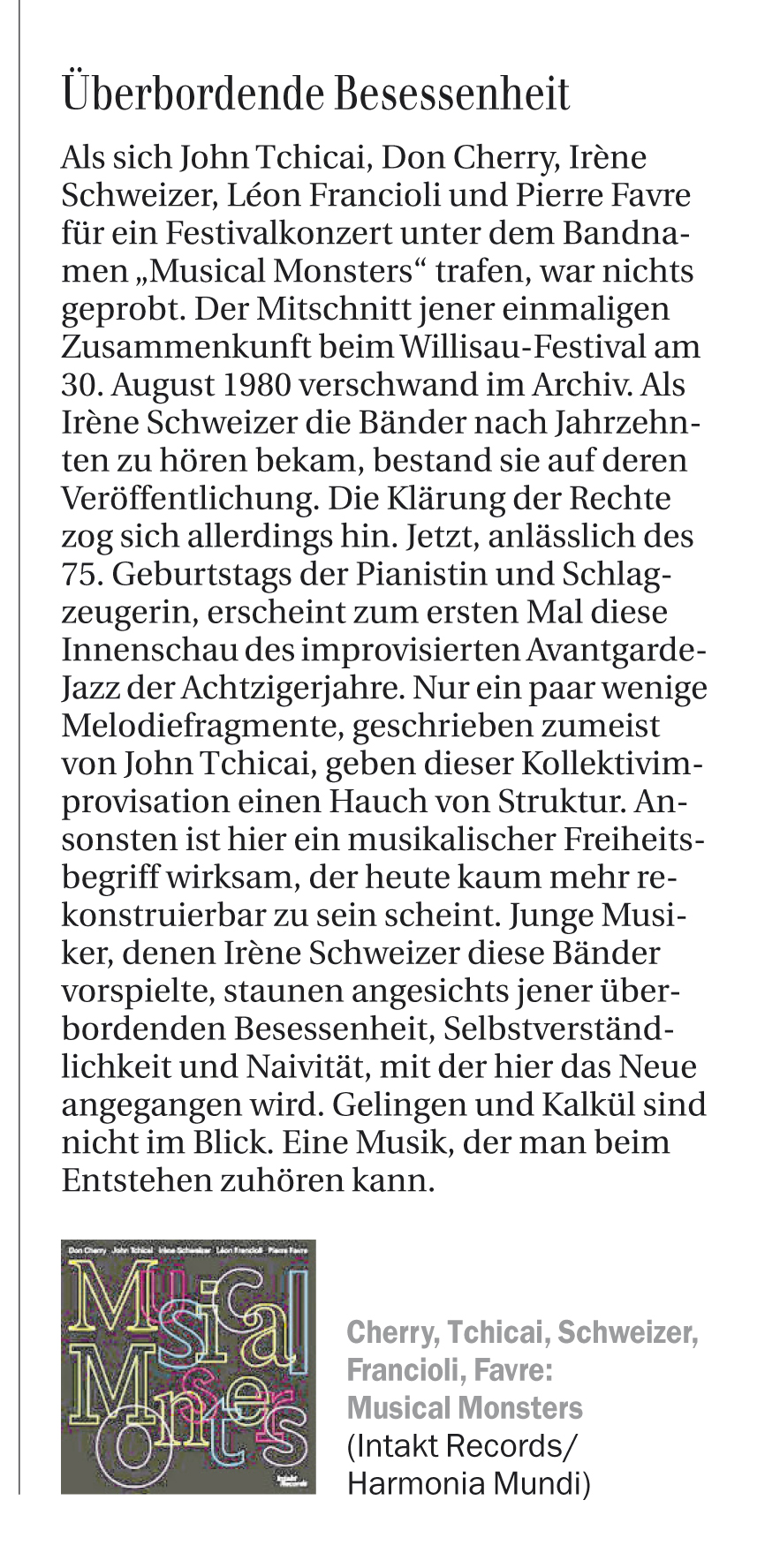
Christian Broecking, Berliner Zeitung, 20-21 August 2016
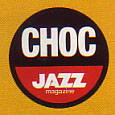
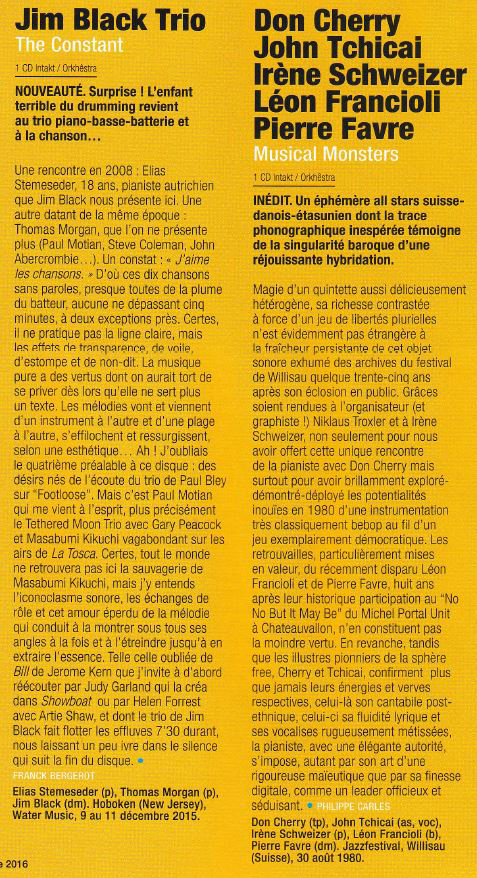
Philippe Carles, Jazzmagazine, Paris, September 2016
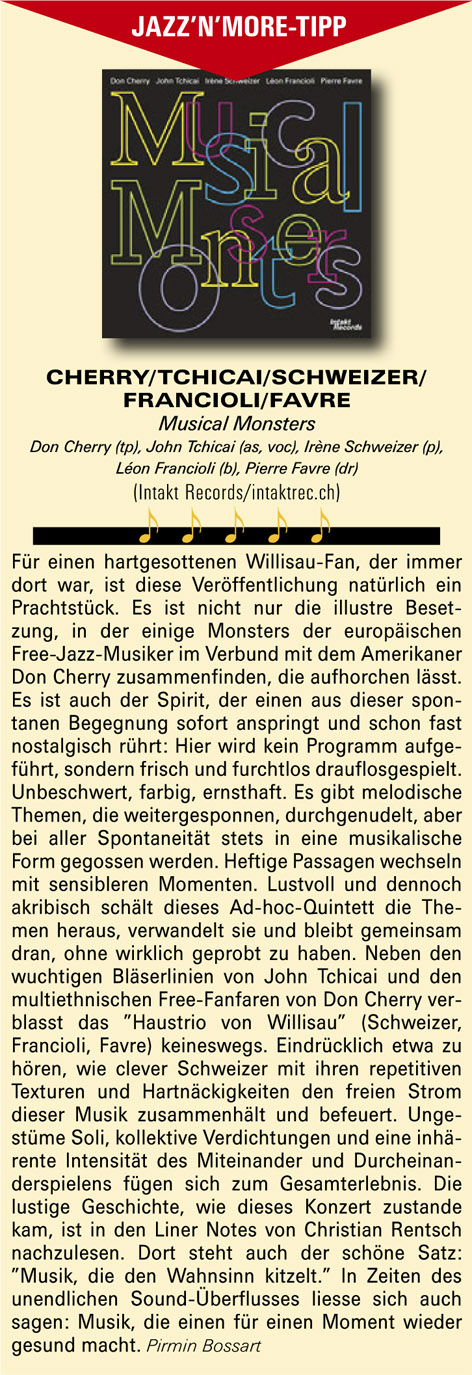
Pirmin Bossart, Jazz'n'more, Schweiz, September 2016
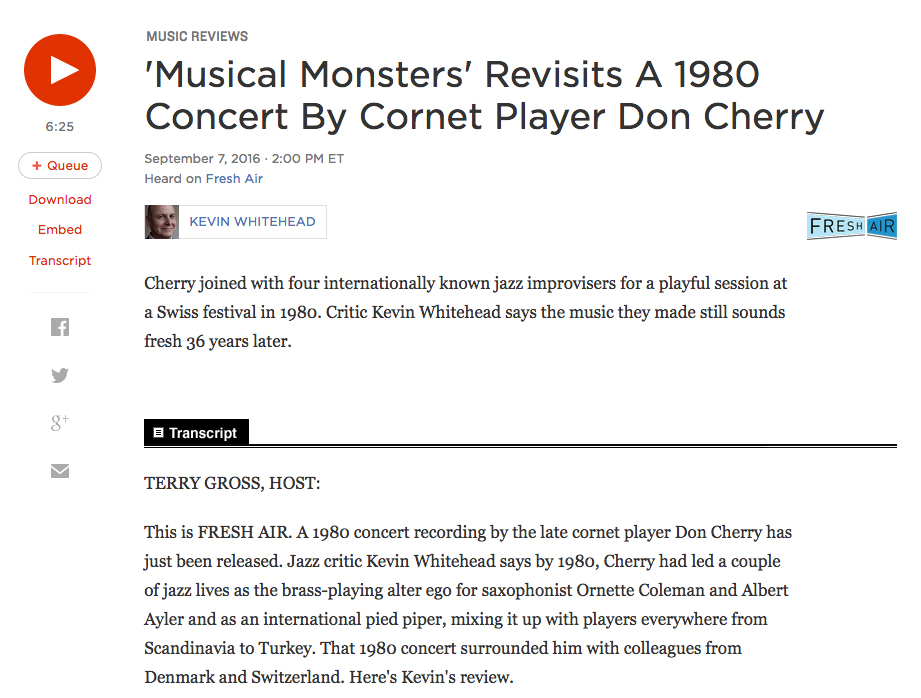
Cherry joined with four internationally known jazz improvisers for a playful session at a Swiss festival in 1980. Critic Kevin Whitehead says the music they made still sounds fresh 36 years later.
TERRY GROSS, HOST:
This is FRESH AIR. A 1980 concert recording by the late cornet player Don Cherry has just been released. Jazz critic Kevin Whitehead says by 1980, Cherry had led a couple of jazz lives as the brass-playing alter ego for saxophonist Ornette Coleman and Albert Ayler and as an international pied piper, mixing it up with players everywhere from Scandinavia to Turkey. That 1980 concert surrounded him with colleagues from Denmark and Switzerland. Here's Kevin's review.
(SOUNDBITE OF ALBUM, "MUSICAL MONSTERS")
KEVIN WHITEHEAD: The five improvisors were in a playful mood when they convened at a Swiss festival in 1980. They included Don Cherry, the vagabond American trumpeter who was reunited with his old colleague, the Congolese Danish saxophonist John Tchicai. And Tchicai had a reunion with another occasional ally, the Swiss pianist Irene Schweizer. Much of the music they made that day was collectively improvised but laced with a few catchy tunes and some of those crazy march beats that European players loved back then.
(SOUNDBITE OF ALBUM, "MUSICAL MONSTERS")
WHITEHEAD: Don Cherry and company, 1980, from a concert recording now out for the first time as "Musical Monsters" in the Intakt label. It's a great example of how well such one-time meetings can go given the right players. In truth, Don Cherry's trumpet chops are pretty shaky, as they often were in later years, but his bugling tone could still rally the troops, and his influence is all over the music. He loved rolling rhythms, fanfare-like tunes and long improvisations broken up by catchy themes. Back in the '60s, he and saxophonist John Tchicai had played together in the New York Contemporary Five. When they reunited in 1980, their blend made the melodies exceptionally vivid, even where Cherry's lip is unsure.
(SOUNDBITE OF ALBUM, "MUSICAL MONSTERS")
WHITEHEAD: As much as anyone, Don Cherry turned jazz on to the scales and rhythms of non-European musical systems, from India to West Africa and beyond. Those influences gave improvisors more options, more ways to create varied music.
(SOUNDBITE OF ALBUM, "MUSICAL MONSTERS")
WHITEHEAD: John Tchicai on alto sax with drummer Pierre Favre and bassist Leon Francioli. Like Don Cherry, Denmark's Tchicai was an international bridge-builder who'd spent many years working in the U.S. He wrote most of the tunes the quintet played, and more than anyone, he directs the action in an unobtrusive way. Tchicai can make a quiet statement that changes the whole band's direction because the other players listen and respond. Hear how pianist Irene Schweizer pivots with him here.
(SOUNDBITE OF ALBUM, "MUSICAL MONSTERS")
WHITEHEAD: This sort of lightly structured improvising is often called free jazz. Some folks take that to mean freedom from good stuff like melody or harmony or swinging. But for Don Cherry and his fellow travelers, free jazz means freedom to choose anything, to be open to all sorts of musical streams and strategies, to be free to play riffs or reject them or to work in whatever appeals to them at the moment. In this case, it made for a literal one-of-a-kind artwork. These particular five players never worked together again, but the music they made sounds fresh 36 years later.
GROSS: Kevin Whitehead writes for Point Of Departure and TONEAudio and is the author of "Why Jazz?" He reviewed Don Cherry's "Musical Monsters" on the Intakt label.
(SOUNDBITE OF MUSIC)
GROSS: Tomorrow on FRESH AIR, my guest will be guitarist Nels Cline. He's best known for his work with the band Wilco, which has a new album called "Schmilco." He's also known for his avant garde albums, but his new album, "Lovers," features jazz standards and covers lushly arranged. I hope you'll join us.
FRESH AIR'S executive producer is Danny Miller. Our senior producer is Roberta Shorrock. Our technical director and engineer is Audrey Bentham. Our associate producer for online media as Molly Seavy-Nesper. John Sheehan directed today's show. I'm Terry Gross.
Kevin Whitehead, Fresh Air, National Public Radio, NPR, USA, September 7, 2016
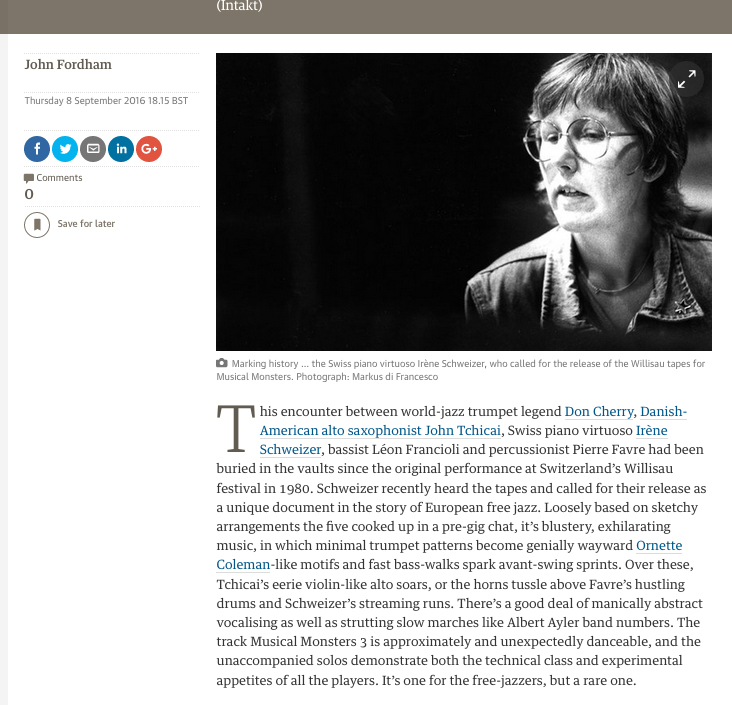
John Fordham, The Guardian, September 8, 2016
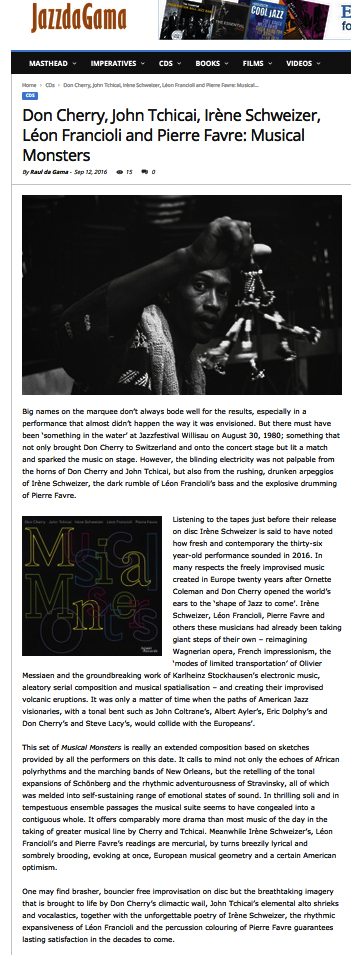
Raul da Gama, Jazzdagama, Sept. 12, 2016
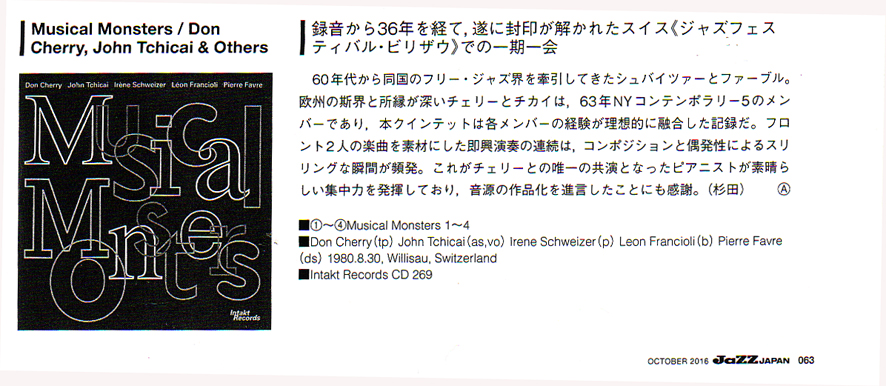
Hiyoki Sagita, Jazz Japaon, Octobere 2016

Kevin Le Gendre, Jazzwise, London, October 2016

Pirmin Bossart, Kulturtipp, September 2016
Built on the memorable chassis of an earlier Willisau encounter, Musical Monsters is the sort of archival event followers of free jazz pine for in their most sanguine moments. Pianist Irene Schweizer and altoist John Tchicai teamed up in a quartet at the Swiss festival in 1975 for a crowd-rousing conclave. Five years later the addition of trumpeter Don Cherry meant even greater odds of an instant classic. Swiss countrymen bassist Leon Francioli and drummer Pierre Favre are on board as well and prove on par with their predecessors Buschi Niebergall and Makaya Ntshoko in fanning the formidable rhythmic fires for the band.
Ace engineer Peter Pfister of Hat Hut label renown is on hand to expertly capture proceedings, an hour-long set that unfolds in semi-medley form and indexes along four loose compositional pivots with plenty of collective improvisational decision-making in-between. Tchicai supplies three of the themes and a fourth borrows from his friend Danish guitarist Pierre Dørge’s songbook. “Real Kristen” materializes in fleeting melodic form before the four are off to the races in a round robin of improvised leads and chases. Francioli and Favre combine in a bustling colorful weave, but there’s a surprisingly elasticity and porousness to the resulting rhythmic fabric. The bassist’s amplification gives his racing pizzicato runs additional bounce and more than one occasion the air of humorous irreverence.
Cherry and Tchicai are uncommonly well-suited foils and each alternate roles between somber legato musings and more frenzied staccato explosions. Schweizer often plies the middle or sits out entirely, timing and positioning her contributions with careful attention to the larger overarching architectures. One such detour occurs three-quarters through the first index point as the horns exchange open-ended melodic overtures with succinctly answering retorts from piano before Schweizer goes it solo for a brief spell. The providently-timed return of Francioli and Favre invests the piece with swelling majesty, replacing the earlier austerity with a nearly overflowing sense of pathos.
“Transportation of Noodles” by comparison almost sounds Steve Lacy-like in its mirthful blend of repetition, spoken word and raw melody voiced by composer Tchicai sans his colleagues. Francioli plucks a brusque, but playful nursery rhyme pattern in answer, but it’s the altoist’s show until a full band entry roughly four minutes in. A circling unison passage at the six-minute mark signifies another deviation in direction with each player toying with and subverting the ostinato in overlapping orbits. Once again Favre’s deft, but assertive touch is an indelible asset in preserving the rhythmic integrity that underlies the loquacious and frequently impassioned conversation between Tchicai and Cherry. A stage-stealing percussion solo brimming with compellingly sculpted space and texture caps the piece in grand fashion.
“Xongly” from Dørge and “Pa Tirstag” by Tchicai each work off further stores of fertile rhythmic material with former particularly infectious thanks to a Schweizer and Favre forwarded, African-indebted groove. Cherry and Tchicai sound off in bursts above the pianist’s rolling ostinato as snare and cymbals spin sharply-caroming accents. Tchicai’s disciplined solo adopts Klezmer-reminiscent contours, jockeying the beat and reverting to vertical geysers of crumpled notes before shifting to a spate of ebullient vocalese sans saxophone. Schweizer is once again the model of a malleable rock, sturdy, but responsive and joins Francioli and Favre in a tumultuous baton race with the horns. Correlating preemptive interest with probable return on the players involved ends up a can’t-lose bet in this particular case.
Derek Taylor, Dusted Magazine, September 21, 2016
Don Cherry and John Tchicai will draw most listeners to this first-time release of Musical Monsters (Intakt), an hour-long set from the 1980 Jazzfestival Willisau, but the titular 'musical monsters' are the band that played behind them: pianist Irène Schweizer, bassist Léon Francioli and drummer Pierre Favre.
Schweizer and Favre were local musicians, involved with the festival from its inception in 1968. By 1980, along with Lausanne-based Francioli, they had become its virtual 'house band', though Schweizer alone co-led with Tchicai the 1975 set subsequently issued on vinyl as Willi The Pig.
The Copenhagen-born Tchicai, then resident in Switzerland after four years in the mid 60s in NYC, fed back into the Zürich jazz scene his experiences of playing and recording with Shepp, Ayler, Coltrane, and the New York Art Quartet, among others. His influence is key here, and of the compositions embedded into the albums four collective improvisations three are by Tchicai, the fourth by Danish avant-jazz guitarist Pierre Dørge, Tchicai's closest collaborator at the time.
It's very much Tchicai's date, but Cherry is in fine lip, if rather self-effacing at times, and here's a fine example of him playing out in an ensemble informed by, but not tethered to, his 'multikulti' ethnocentric sensibilities. Still, this is music with much in common with the outernational strand in European jazz, cf. the roughly contemporaneous Brotherhood of Breath in Britain: necessarily not as authentically South Afro-centric, but similarly earthy and celebratory in spirit, and very different to the music-school-inculcated deliberation that informs much modern European jazz.
"Musical Monsters 1" is instantly upbeat and occasionally frenetic, trumpet and alto sax trading pithy, Ayleresque clarions and liquid licks. Tchicai solos, briefly, in a slightly sour register with occasional hints of Shepp and, more surprisingly, latter-day John Surman, over a stop-start but funky groove, with Schweizer's keys tumbling and chinking inside. She and the ceaselessly, inventively propulsive Francioli and the restlessly bustling Favre also get some much deserved solo/duo space, and pianist and horns play as an exposed and exploded trio around nine minutes in, leading to a thematic close on Tchicai's theme "Real Kirsten".
"Musical Monsters 2" kicks off with a sour Tchicai solo, then builds from a slightly unstable vamp through a freewheeling middle passage, prodded on by Tchicai's vocal exhortations. Later his "Transportation of Noodles" gets folded in (sounding rather like Albert Ayler paraphrasing Syd Barrett's "Golden Hair", when not explicitly citing "Three Blind Mice"). Schweizer is superb, again, finding space for melodic irruptions of sprightly, Cecil Taylor-influenced ivory detonation. After an exploratory exposition, the performance is capped by a lengthy but masterfully creative, polyrhythmic, kit drums and percussion solo.
Both "Real Kirsten" and "Transportation of Noodles" were revisited by Tchicai and Dørge in 1981 for their duo album Ball at Louisiana Museum of Modern Art. Dørge's "Xongly", which provides the spinal vamp of "Musical Monsters 3", appeared on the guitarist's Tchicai-featuring 1980 album Ballad Round The Left Corner. Cherry plays some of his best licks on this jauntily rambling cut, particularly with the core Monsters trio in a frenetic late breakout (Schweizer playing another standout solo): but it's Tchicai and the others who sound tightest-and-loosest throughout, as Tchicai occasionally breaks into Afro-song/scat to the tune of its loping groove.
This is a magnificent, fresh-sounding set, and another superb, sadly retrospective addition to John Tchicai's modestly burgeoning discography: see also Treader's recent Clapham Duos with Evan Parker. Parker, incidentally, back in the 60s, formed a quartet with Schhweizer, Favre and bassist Peter Kowald. Musical Monsters is the sort of compulsively enjoyable and revelatory release that encourages plenty of this sort of crate-digging. Thanks and kudos to Intakt (co-founded by Schweizer) for negotiating its release.
Tim Owen, Dalston Sound, London, September 28, 2016
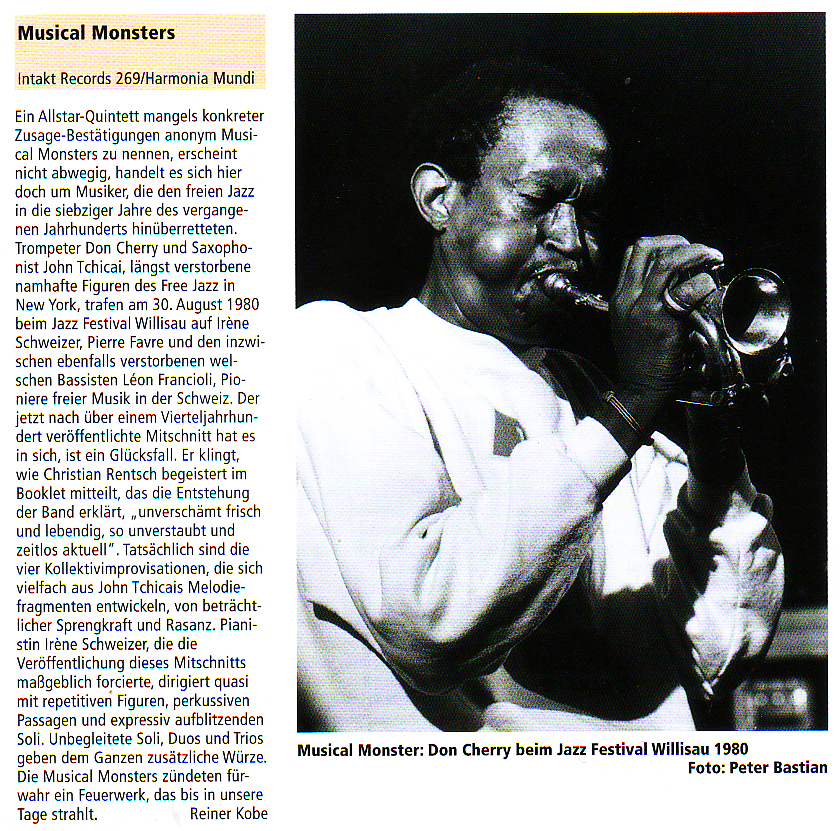
Reiner Kobe, Jazzpodium, Oktober 2016
Często zastanawiam się nad mechanizmami, które wprawiają w ruch biznes muzyczny. Ta niemająca nic wspólnego ze sztuką maszyna sprawia, że wydawcy decydują się z sobie tylko znanych powodów wydawać płyty, które raczej nigdy nie powinny się ukazać, inne nagrania natomiast na lata, czasem całe dziesięciolecia lądują na półkach, czasem czekając cierpliwie na swoją kolej, czasem ginąc na zakurzonych półkach w oczekiwaniu na cudowne odnalezienie. W takie cudowne i przypadkowe odnalezienia niekoniecznie wierzę każdemu wydawcy na słowo. To często element promocyjnej strategii.
Koncert wydany przez Intakt czekał na swój czas 36 lat. Dlaczego – nigdy się nie dowiemy. Czekał starannie zarejestrowany i zabezpieczony przed upływem czasu w prywatnych archiwach organizatora festiwalu w Willisau – Niklausa Troxlera. Ten festiwal jest źródłem wielu ciekawych nagrań, a wytwórnia Intakt korzysta z archiwum organizatorów wydając między innymi wyśmienity koncert Cecila Taylora – "The Willisau Concert" z roku 2000.
Inicjatorką wydania "Musical Monsters" jest Irene Schweizer, która po latach zauważyła, że zarejestrowany w 1980 roku spontaniczny i w pełni improwizowany materiał dobrze zniósł próbę czasu nie tylko w związku ze starannym przechowywaniem przez posiadacza taśm – wspomnianego już Niklausa Troxlera, ale przede wszystkim w związku z wyśmienitą muzyką, jaką wtedy udało się zagrać i zarejestrować.
"Musical Monsters" to jedyna okazja, kiedy Irene Schweizer spotkała się na scenie z Donem Cherry. Tytuł albumu świetnie oddaje naturę festiwalowego spotkania. Oto bowiem na jednej scenie stanęli Don Cherry – guru freejazzowej awangardy i jeden ze współtwórców fusion. Dla europejskich słuchaczy był częścią legendy Ornette Colemana. Wiele lat mieszkał w Europie i często grał z muzykami tworzącymi w latach siedemdziesiątych i osiemdziesiątych europejską scenę muzyki improwizowanej. Grono muzyków, z którymi współpracował było niezwykle zróżnicowane, wśród nich oprócz Ornette Colemana, Johna Cotrane'a i Carli Bley znajdziecie między innymi Lou Reeda, Colina Walcotta, Sun Ra i Krzysztofa Pendereckiego (album "Actions"). Irene Schweizer w 1980 roku była jednym z liderów europejskiej muzyki improwizowanej. Współpracowała z perkusistą Louisem Moholo i została zaproszona przez Lindsay Copper do Feminist Improvising Group. W Europie nie grało się wtedy free jazzu, to była europejska muzyka improwizowana. To w wielu przypadkach otwierało drzwi do sal koncertowych i festiwali znanych z klasycznego repertuaru. W niektórych krajach również ułatwiało uzyskanie instytucjonalnego wsparcia, które było potrzebne, a niechętnie udzielane twórcom muzyki rozrywkowej, czyli jazzu, ambitna awangarda, to co innego.
John Tchicai urodził się w Danii, ale muzyczne szlify zdobywał w Nowym Jorku pod okiem Archie Sheppa, Alberta Aylera i Johna Coltrane'a, więc kiedy wrócił do Europy stał się jedną z głównych postaci wszelakiej awangardowej muzyki improwizowanej. Scena festiwalu w Willisau była mu dobrze znana, podobnie jak kreatywność Irene Schweizer – razem nagrali tam w 1975 roku dobrze przyjęty album "Willi the Pig".
Pierre Favre i Leon Francioli to uznani szwajcarscy muzycy, często udzielający się w awangardowych projektach. Pierre Favre współpracował z Irene Schweizer od lat, a koncert zagrany na festiwalu w Willisau w 1968 roku przez Trio w składzie Irene Schweizer – Pierre Favre – George Mraz uchodzi za jedno z pierwszych ważnych freejazzowych wydarzeń w Szwajcarii. Prawdopodobnie nie został jednak zarejestrowany – chyba, że Niklaus Troxler znajdzie go kiedyś przypadkiem w czasie świątecznych porządków. Późniejsze często powtarzane na festiwalu koncerty zespołu, w którego składzie miejsce George'a Mraza zajął Leon Francioli dały temu zespołowi nie tylko status nadwornej sekcji festiwalu, ale również pozwoliły zapraszać do wspólnej improwizacji gości, którymi w 1980 roku byli Don Cherry i John Tchicai. Ten ostatni miał początkowo zagrać z własnymi muzykami, ale po festiwalu w Montreux był zmuszony wysłać muzyków do domu do Danii, bo nie mógł im zaoferować wystarczającej ilości koncertów, żeby mogli zarobić na utrzymanie w oczekiwaniu na festiwal w Willisau. Po raz kolejny okazało się, że warto mieć status dyżurnej sekcji rytmicznej..
Tak więc wszyscy muzycy grywali ze sobą w przeróżnych konfiguracjach już wcześniej, choć dla Irene Schweizer i Dona Cherry był to ich pierwszy wspólny występ. Don Cherry pojawił się w Willisau w dzień koncertu i muzycy wyszli na scenę w zasadzie bez próby, uzgadniając jedynie tytuły kilku utworów, które będą stanowić podstawę do spontanicznego muzykowania. Reszta to muzyczna magia. Posłuchajcie sami.
Rafał Garszczyński, RadioJAZZ.FM poleca! Poland, 03 październik 2016
Interview von Georg Spindler, Mannheimer Morgen, 7.10.2016, Deutschland

Jean Buzelin. Disques, livres & Co » Chroniques 2016. 14 Octobre 2016.
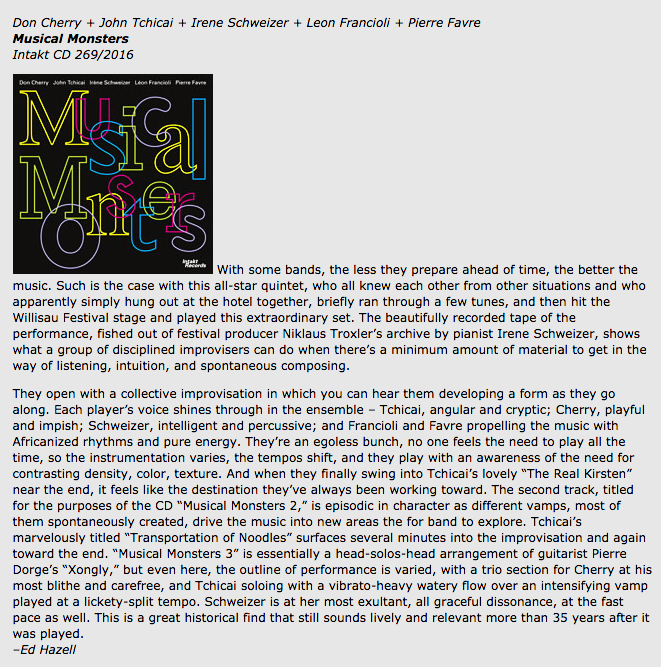
Ed Hazel, Point of Depurture 56, USA, 2016
Mit Musical Monsters fördert das Label einen Schatz aus dem Jahr 1980 zutage: Es handelt sich um ein äußerst inspiriertes Zusammentreffen der Legenden Don Cherry, John Tchicai, Irène Schweizer & Pierre Favre sowie des, insbesondere mit dem Bogen exzellierenden, Bassisten Léon Francioli im Schweizer Willisau. Über die vier erstgenannten Herrschaften ist es wohl überflüssig, weitere Worte zu verlieren. Zu hören ist ein buntes, feuriges, bisweilen rasantes Set aus vier Stücken: Komponierte Passagen verbinden Kollektivimpros, begleitete und unbegleitete Soloausflüge; die Stimmung ist prächtig, die Funken fliegen; Free Jazz, auch inklusive dahinfetzender geswingter Passagen, locker Flockiges, lyrisch Folkiges, ein modaler Groove im 5/4 Takt, opulente, dicht formulierte, freizügige Debatten. Das Menü ist also sehr reichhaltig und mundet zudem prächtig. Sehr zu empfehlen – nicht zuletzt auch für Archivare. Doch noch ein Satz zu Tchicai: Schade, dass dieser Meister, ungeachtet seiner bedeutenden Beiträge zur Entwicklung des freien Jazz, in vielen Betrachtungen zum Thema immer ein wenig unter den Tisch zu fallen scheint.
bertl, Freistil 69, 2016
Per "registrazione storica", se guardiamo all'àmbito classico, è da intendersi la ripresa di un momento interpretativo che condensi lo spirito di performer in speciale stato di grazia da cui irradii in qualche misura anche lo spirito di un momento, evolutivo se tale apporto indurrà riposizionamenti interpretativi e ulteriore stato conoscitivo.
Si può ritenere (anzi così è inteso) che anche nel jazz (àmbito che da gran tempo ingloba e interseca più filoni, sottofiloni e retroterra progettuali) si possano additare momenti particolarmente "felici" nel segnare una svolta fissando un rinnovato (o particolarmente critico) approccio formale.
Tale premessa (certamente evitabile e di poca o punta utilità!) è molto probabilmente applicabile ad un'inedita, quanto preziosissima registrazione caratterizzata da una line-up inedita, e galvanizzante non soltanto nelle premesse, con l'ulteriore valore aggiunto di ricollegarci ad una speciale stagione creativa.
Dall'edizione 1980 del Willisau Jazzfestival una "very special one performance", per intenderci (di cui si è anche titolato qualche album, alla fin-fine nemmeno capitale, di ben altri performers), che è momento d'incontro "naturalmente" afferente all'anti-forma free - ma non circoscritto a ciò! – ed entro cui non latita certo il senso della composizione ma ancor meglio dell'edificazione visionaria,
La giocondità e il colorismo delle trovate (sempre molto riconoscibili) di Cherry, il sagace tocco di scalpello delle scabre ance di Tchicai (talvolta civettuole, ma sempre pregnanti), la potenza figurativa delle corde basse di Francioli, il forsennato gioco di tamburi e cimbali di Favre, lo smalto acuminato e il rigorismo della tastiera di Schweizer, animano con grande assortimento di personalità ma fattiva intesa un momento che intatto continua ad irradiare l'esplosività delle incendiarie pulsioni di cui il momento segnò per più versi un acme.
Le energie dei singoli assumono progressivamente grande corpo, in una tensione collettiva d'eleganza apparentemente trascurata ma non di meno solida, in cui lo spiritato e grottesco senso danzante di Tchicai e Cherry s'impatta sulle geometrie oblique di Schweizer e Favre, ed è ai due fuoriclasse elvetici (pur nelle differenti traiettorie successive) che sembra toccare il testimone della continuità di quella grande avventura. In particolare il merito d'averla fortemente voluta riesumare da un'inerte pista registrata va ascritto alla grandissima pianista, peraltro attiva in veste produttiva entro la piccola ma altamente prolifica famiglia Intakt records, di grande e sensibile responsabilità nell'elargire un prezioso recupero da un passato che appare già remoto, ma non certo rimosso e ancor meno dismesso sia nella memoria che nel lavoro dei contributivi epigoni; un live di non usuale pregio che non soltanto soddisferà quanti cercassero una corposa integrazione alle discografie e ai làsciti almeno dei due scomparsi maestri, ma offrirà al contemporaneo uditorio un polso, ed una pugnace idea di una stagione per varie ragioni irripetibile.
Aldo Del Noce, Jazzconvention, Martedì 01 Novembre 2016
 GERMAN CRITICS AWARD GERMAN CRITICS AWARD
PREIS DER DEUTSCHEN SCHALLPLATTENKRITIK / VIERTELJAHRESLISTE 4/2016
Die Bestenliste des vierten Quartals 2016 zeichnet die CD von Don Cherry-John Tchicai, Irène Schweizer, Léon Francioli, Pierre Favre mit dem Titel "The Musical Monsters" (Intakt CD 269) aus. Die Begründung der Jury:
"Als sich John Tchicai, Don Cherry, Irène Schweizer, Léon Francioli und Pierre Favre im Jahr 1980 für ein einmaliges Konzert unter dem Namen "Musical Monsters" beim Willisau-Festival trafen, war nichts geprobt. Zum 75. Geburtstag der Pianistin Irène Schweizer erscheint diese Innenschau des improvisierten Avantgarde-Jazz der achtziger Jahre jetzt zum ersten Mal. Nur ein paar wenige Melodiefragmente geben der Kollektivimprovisation einen Hauch von Struktur. Ansonsten ist ein musikalischer Freiheitsbegriff wirksam, der heute kaum mehr rekonstruierbar zu sein scheint - angesichts jener überbordenden Besessenheit, Selbstverständlichkeit und Naivität, mit der das Neue angegangen wird. Gelingen und Kalkül sind nicht im Blick: eine Musik, der man beim Entstehen zuhören kann." (Für die Jury: Christian Broecking)

João Santos, Expresso, Portugal, November, 2016
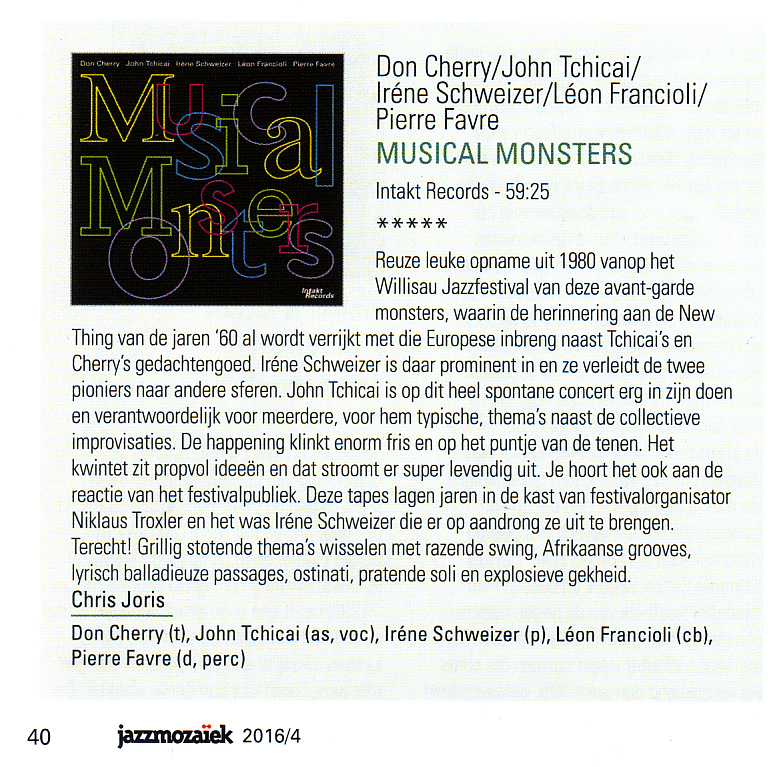
Chris Joris, Jazzmozaiek, 2016/4
Matthias Mader, Hereingehört. www.matthias-mader.de, Deutschland, 19.12.16
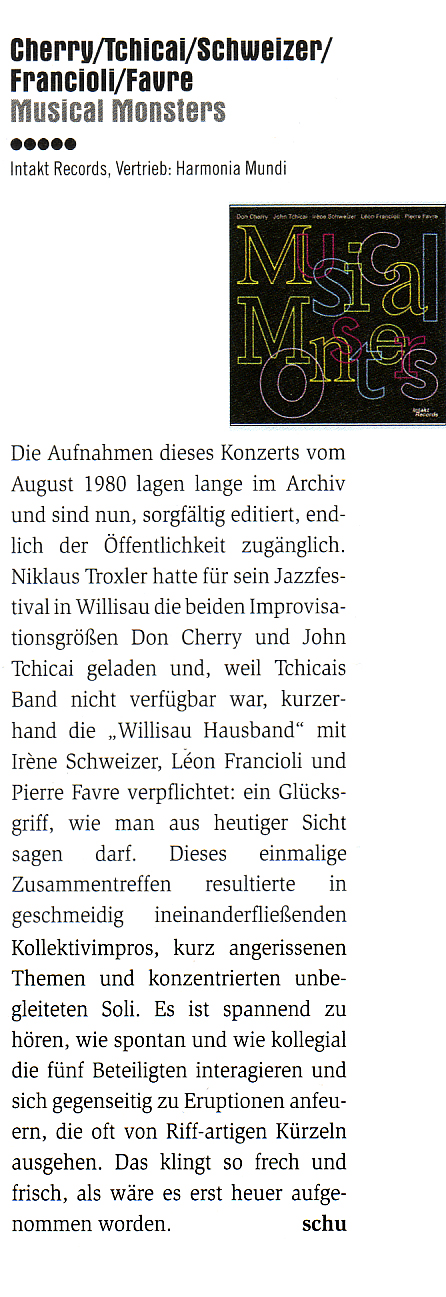
schu, Concerto, Österreich, Dezember 2016
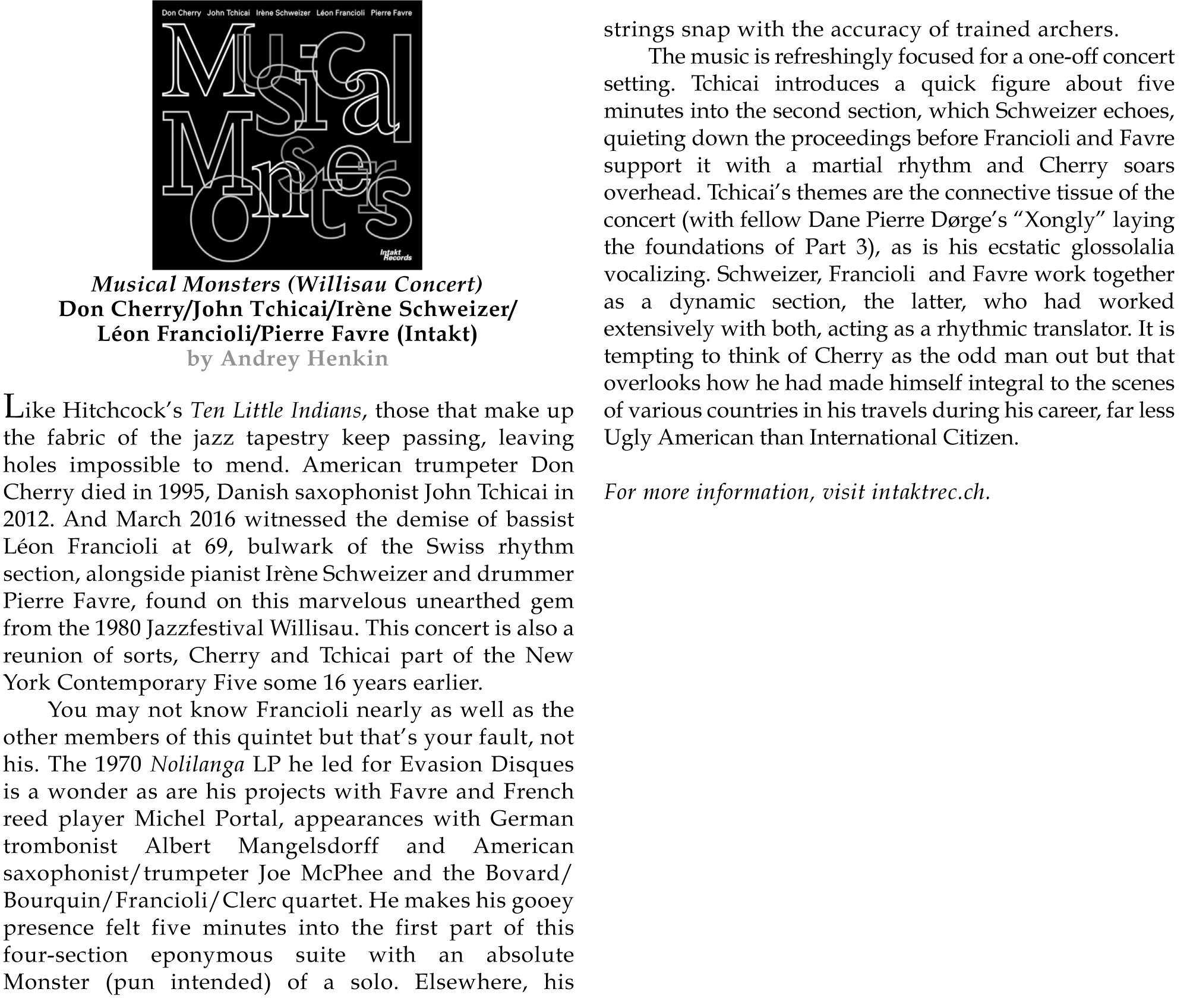
Andey Henkin, New York City Jazz Record, January 2017
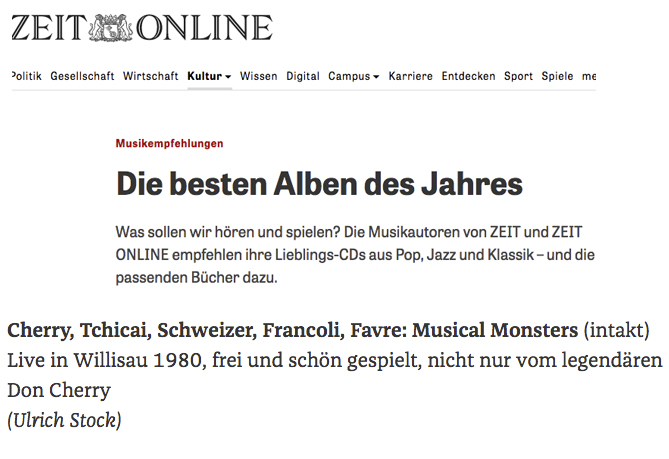
Ulrich Stock, Die Zeit, Dezember 2016
L'histoire se passe en 1980 en Suisse, au festival de Willisau organisé par Niklaus Troxler – personnage essentiel dans la naissance d'une scène free helvète voire pangermanique si on est enthousiaste. L'histoire, ou plutôt les histoires qui aboutissent à cette réunion unique de cinq musiciens atypiques, dont rien ne laissait présager qu'ils puissent se retrouver si ce n'est leur amour pour cette musique. Dans une tradition commencée dès Ornette, le quintet des monstres musicaux se met à table, presque pas de répète, ce qui ne se ressent que rarement au long de cette bouleversante heure de live qui impose de remercier Irène Schweizer d'avoir fait lobbying auprès des esthètes d'Intakt Records pour sa publication.
Le quintet dano-newyorko-helvète se lâche sur quatre suites qui tournent vite à une surenchère jouissive de soli débauchés d'énergie, en quête des limites d'une expressivité kaléidoscopiques, tout en s'ancrant dans le travail d'une rythmique qu'on ne soupçonnait guère capable de cette musique-là en dépit de toute l'estime qu'on a pour les musiciens qui la composent : est-ce Don Cherry qui apporte cet esprit blues, ce groove sans démagogie qui donne des ailes et des shuffles presque boogie à Irène Schweizer (''Musical Monsters 2'', ils ne se sont pas trop fait chier pour les titres) ? Est-ce John Tchicai dont on n'oublie pas qu'il fut aux côtés de Shepp, Trane et consorts dès les années 60 ? Est-ce juste qu'on se trompe toujours à catégoriser ?
John Tchicai, tiens : l'altiste tient le haut du pavé dans cette séance qu'il porte vers le rituel de transe, chantant dans son saxophone, soufflant des textes sans paroles avec une gravité chamanique à l'efficacité sans préciosité ; et l'auditeur d'être possédé... Don Cherry, arrivé un peu à l'arrache au festival, emprunte quant à lui un ton d'ensemble qui surprend à le resituer dans ces projets de l'époque, qui l'emmenaient plus vers la fusion : on est à l'époque de Codona, son trio fou avec Nana Vasconcelos et Collin Walcott ; et pas si longtemps après Brown Rice (1975). Le trompettiste retrouve ici les premiers accents écorchés de sa musique, tout en faisant intervenir de nouvelles considérations mélodiques sublimées – je me répète, mais chroniquer c'est bégayer – par la section.
Cette dernière aussi jouit à plein de la liberté du contexte : solo assez ouf de Pierre Favre (''Musical Monsters 2''), groove et liberté presque ellingtonienne de Schweitzer dans l'accompagnement libertaire, basse chtonienne de Léon Francioli (la ligne de ''Musical Monsters 3'', parmi d'autres). Une heure à n'en pas finir : de s'étonner de l'actualité de cette musique, des coïncidences qui ont présidé à son existence, heureuse providence !, de l'énergie dansante, de cette possibilité absurde de faire ça, comme ça, de cette façon-là. De s'étonner de constater, au cas où certains salisseurs de mémoires se poseraient la question, qu'Intakt n'a pas qu'un catalogue de musiques improvisées européennes a-swinguées. Puis l'on arrête de s'étonner, et on se le remet une nouvelle fois parce qu'il est bon de ne plus penser. Parce que bientôt l'équinoxe ; nous cherchons tous une musique pour égorger un coq et invoquer les esprits, régénérer la Terre-mère. Parce que Don Cherry soigne le cancer. Parce que on veut voir des concerts, maintenant, hic comme nunc. Parce que...
Pierre Tenne, Djam, France, 2016

Stewart Smith, The Wire, April 2017
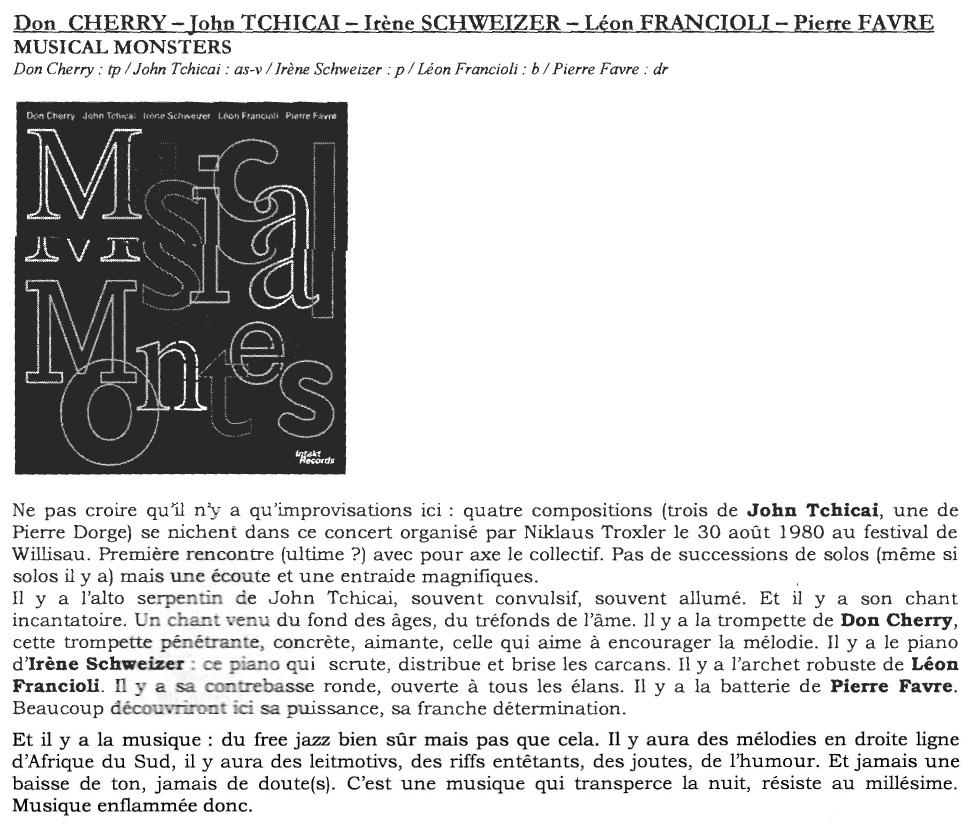
Luc Bouquet, Improjazz Nr. 234, France, 2017
|
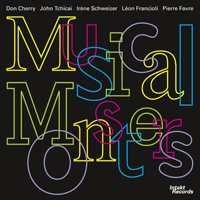















 GERMAN CRITICS AWARD
GERMAN CRITICS AWARD 





